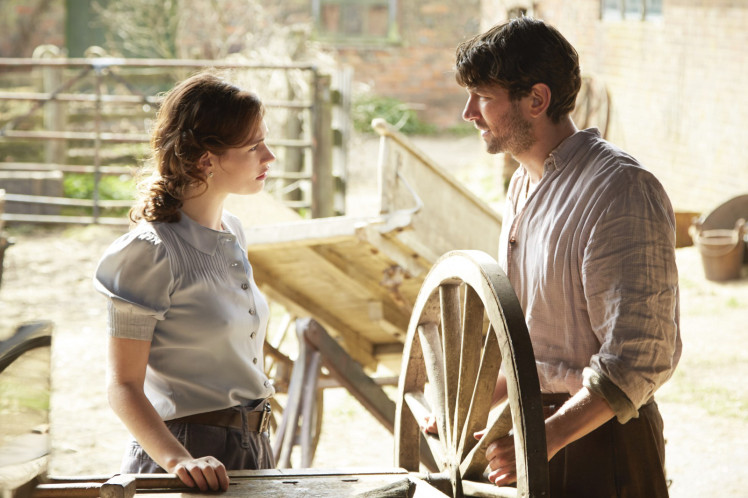At Filmhouse, Edinburgh from Fri Apr 20 2018
A fine example of the wisdom in lowering one’s expectation, The Guernsey Literary and Potato Peel Pie Society is a twee romp through a lush garden of a thousand clichés, but entertains and engages in spite of itself.
In the immediate aftermath of World War II, young writer Juliet Ashton (Lily James) visits Guernsey to hear the story of the titular club, having corresponded with one of its founders, Dawsey Adams (Michiel Huisman). The society was formed during the wartime occupation of the island by the Nazis, and their story is uncovered by Juliet as she falls for the picturesque surroundings and their inhabitants.
There isn’t a single frame of Mike Newell’s film that surprises, or feels like it’s escaped the grip of a studio board desperate to pump the grey pound like the last drops from an oil well. It falls victim to a misty-eyed Hovis-ad take on wartime, only nodding at the true horror as a cynical plot device on which to hang its breezy romantic whimsy. The film is also guilty of the appallingly patronising trope in which a city sophisticate “finds themself” thanks to the simple rustic goodness of an eccentric bunch of yokels; a story line that was subverted nearly half a century ago by The Wicker Man, and hammered to pulpy parody by The Vicar of Dibley.
However, Newell is an old hand at a good crowd-pleaser with just enough of an edge, and for all its myriad shortcomings, TGL&PPPS is a lot more appetising than the tuberous dish of the title. This is largely down to some immensely appealing performances, not least Lily James as the charming, empathetic Juliet, and a rugged Huisman as the Gabriel Oak-like Dawsey. The pair have an easy chemistry. Also particularly good is Katherine Parkinson, who breathes real life into what could have been the stock caricature of a loveable oddball. There’s a standout scene of genuine poignancy between the two women, hinting at a shattering wellspring of loneliness that bolsters the theme of friendship and surrogate family that shines through the gauzy surface.
There is also enough decent writing here that the lengthy run-time never seems a chore. In those moments of inertia, there is enough heavy lifting done by the cast, or by the spectacular scenery of Devon and Cornwall (yes, it’s not actually Guernsey) to carry it through. Yes it’s predictable, painfully nostalgic, and unchallenging; but it’s also big-hearted, positive and rather a lot of fun. It would be easy to be sniffy about the film, but for what it is, it’s been done very well. Expect the target audience of The Guernsey Literary and Potato Peel Society not to give two hoots for any critical pearl-clutching, and for it to merrily follow in the footsteps of Exotic Marigold Hotel as a resounding box office winner. That title will do it no favours though.
